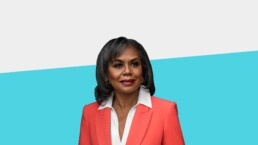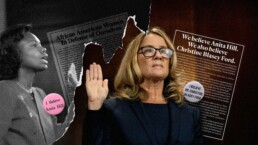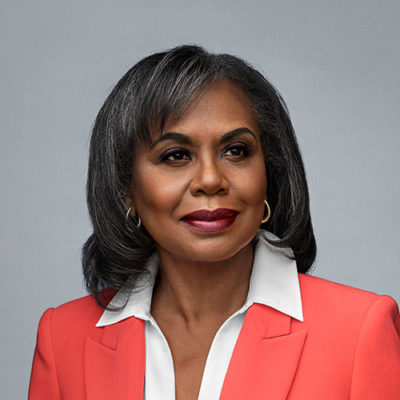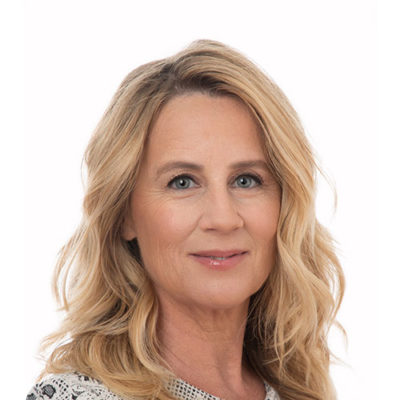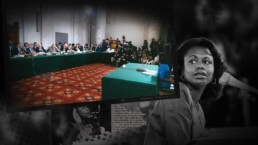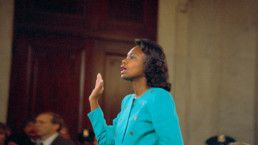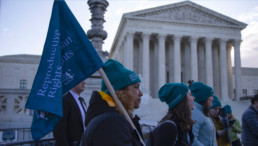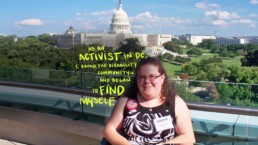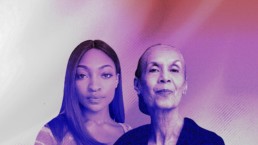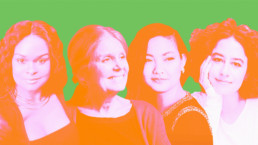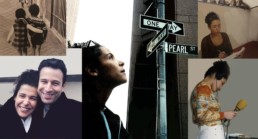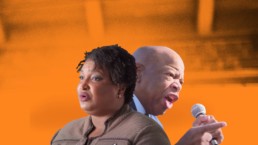Join us in Los Angeles October 16 for a special event with Professor Anita Hill
Thirty years after Professor Anita Hill started a national conversation about sexual harassment in the workplace, how far have we come on issues of gender-based violence? If you’re in the Los Angeles area, please join Dr. Salamishah Tillet and Cindi Leive, hosts of our new podcast Because of Anita, for an afternoon exploring these issues—featuring Professor Hill herself.
Because of Anita: Truth, Justice, Race, Gender, and Power—30 Years Later will be held on October 16 from 3 pm to 6 pm PT at the University of Southern California. This special event will feature artists, scholars, and activists in dialogue, along with a special keynote conversation between Professor Hill, author of Believing: Our Thirty-Year Journey to End Gender Violence, and Beverly Guy-Sheftall, Anna Julia Cooper Professor of Women’s Studies at Spelman College. Rsvp now for this free event.
EVENT DETAILS
DATE
Saturday, October 16, 2021 from 3 pm to 6 pm PT
TIME
3 to 5 pm: Panels and Conversations
5 to 6 pm: Keynote Interview with Professor Anita Hill
LOCATION
Norris Cinema Theatre and Bing Theatre
University of Southern California
Los Angeles, CA
SPEAKERS
Jill Abramson: Senior Lecturer, Harvard University; Co-author, Strange Justice: The Selling of Clarence Thomas
Roxane Gay: Bestselling author; Editor, Not That Bad: Dispatches from Rape Culture
Fatima Goss Graves: President and CEO, National Women's Law Center
Thomasina Gross: Former events server, Chateau Marmont; Actor
Professor Beverly Guy-Sheftall: Anna Julia Cooper Professor of Women's Studies, Spelman College
Professor Anita Hill: Author, Believing: Our Thirty-Year Journey to End Gender Violence
Gabrielle Horton: Audio Storyteller and Adjunct Faculty, USC Annenberg School for Communication and Journalism
Cindi Leive: Co-host, “Because of Anita;” Co-founder, The Meteor
Senator Connie M. Leyva: Member of the California State Senate
Kim Masters: Editor-at-Large, The Hollywood Reporter; Host, KCRW’s “The Business”
Freida Lee Mock: Director, Writer, and Producer, Anita: Speaking Truth to Power, and Ruth: Justice Ginsburg in Her Words
Tony Porter: Chief Executive Officer, A Call to Men
Nina Shaw: Co-founder and Board Member, The Hollywood Commission
Dr. Salamishah Tillet: Co-host, “Because of Anita;” Contributing Critic-at-Large, The New York Times
Scheherazade Tillet: Co-founder and Executive Director, A Long Walk Home
Mily Treviño-Sauceda: Executive Director and Co-founder, Alianza Nacional de Campesinas, Inc.
Professor Miki Turner: Associate Professor of Professional Practice, USC Annenberg School for Communication and Journalism
Jessica Yellin: Peabody, Gracie, and Emmy Award-Winning Political Journalist
The event will also include a performance of “The Scarlet C” by playwright Lynn Nottage, directed by Anita Dashiell-Sparks, professor at the USC School of Dramatic Arts, and featuring USC students Dara Adedara, Kennedy Hill, and Nicole Royster.
Presented by USC Visions and Voices: The Arts and Humanities Initiative and The Meteor. Co-sponsored by the USC Annenberg School for Communication and Journalism, USC School of Cinematic Arts, USC School of Dramatic Arts, and USC Gould School of Law. Special thanks to Audible.
AGENDA
SESSION 1: WHAT HAPPENED?
Opening Remarks
-Willow Bay, Dean, USC Annenberg School for Communication and Journalism
-Daria Yudacufski, Executive Director, Visions and Voices
Re-Examining Anita Hill’s Testimony
Revisiting the fateful October 1991 weekend when Hill testified before the Supreme Court Judiciary Committee that her boss, Supreme Court nominee Clarence Thomas, had sexually harassed her.
-Jill Abramson, Senior Lecturer, Harvard University, and Co-author, Strange Justice: The Selling of Clarence Thomas
-Freida Lee Mock, Director, Writer, Producer, Anita: Speaking Truth to Power, and Ruth: Justice Ginsburg in Her Words
Moderated by
-Cindi Leive, Cohost, “Because of Anita,” and Co-founder, The Meteor
-Dr. Salamishah Tillet, Cohost, “Because of Anita,” and Contributing Critic-at-Large, The New York Times
“Not That Bad”
From Hill's testimony to today, how our culture diminishes survivors’ experiences—and what that costs us.
-Roxane Gay, Bestselling author; Editor, Not That Bad: Dispatches from Rape Culture
Interviewed by
-Professor Miki Turner, Associate Professor of Professional Practice, USC Annenberg School for Communication and Journalism
SESSION 2: WHERE ARE WE NOW?
What the Law Owes Survivors
Hill’s testimony gave way to a dramatic uptick in people filing sexual harassment complaints. We’ll discuss how legal options fit into our path to eradicating abuse at work now.
-Fatima Goss Graves, President and CEO, National Women’s Law Center
-Senator Connie M. Leyva, Member of the California State Senate
Moderated by
-Jessica Yellin, Peabody, Gracie and Emmy Award-Winning Political Journalist
Hotels, Restaurants, and Farms: Report from the Harassment Frontlines
Stories from women who experienced harassment — before and after Hill gave us the language to describe it — and are fighting to make these fields safer.
-Thomasina Gross, Former Events Server, Chateau Marmont, and Actor
-Mily Treviño-Sauceda, Executive Director and Co-founder, Alianza Nacional de Campesinas, Inc.
Moderated by
-Gabrielle Horton, Podcast Showrunner and Adjunct Faculty at USC Annenberg School for Communication and Journalism
Has Hollywood Changed?
Two entertainment leaders who are pushing for accountability take stock and discuss how reporting and data are tools to create progress.
-Kim Masters, Editor-at-Large, The Hollywood Reporter, and Host, KCRW’s “The Business”
-Nina Shaw, Co-founder and Board Member, The Hollywood Commission
Moderated by
-Cindi Leive, Cohost, “Because of Anita,” and Co-founder, The Meteor
In Defense of Ourselves: Demanding Justice for Black Girls and Women
Thirty years after a group of Black feminists showed their solidarity with Hill with “African American Women in Defense of Ourselves,” an ad in The New York Times, what support do Black women and girls critically need from the anti-violence movement?
-Tony Porter, Chief Executive Officer, A Call to Men
-Dr. Salamishah Tillet, Cohost, “Because of Anita,” and Contributing Critic-at-Large, The New York Times
-Scheherazade Tillet, Co-founder and Executive Director, A Long Walk Home
SESSION 3: WHAT’S NEXT?
Special Performance: The Scarlet C
A performance of playwright Lynn Nottage’s “The Scarlet C” in honor of Professor Hill.
Directed by
-Anita Dashiell-Sparks, Professor of Theatre Practice in Acting, Associate Dean of Equity, Diversity & Inclusion (EDI), and Co-Head of Undergraduate Acting, USC School of Dramatic Arts
Performances by
-Dara Adedara, Student, USC School of Dramatic Arts
-Kennedy Hill, Student, USC School of Dramatic Arts
-Nicole Royster, Student, USC School of Dramatic Arts
Keynote Conversation: Anita Hill on Believing
Anita Hill shares her own personal reflections on the hearing and its aftermath — and takes you inside her 30-year journey to end gender violence.
-Professor Anita Hill, Author, Believing: Our Thirty-Year Journey to End Gender Violence
-Professor Beverly Guy-Sheftall, Anna Julia Cooper Professor of Women’s Studies, Spelman College
Listen: Professor Anita Hill & Dr. Christine Blasey Ford
In 2018, Dr. Christine Blasey Ford stood before the Senate Judiciary Committee and testified that Supreme Court nominee Brett Kavanaugh had sexually assaulted her when they were both in high school, allegations he denies. Many of us watched—but perhaps the only person who truly understood what Dr. Ford was going through was Professor Anita Hill, who had appeared before the same committee 27 years earlier.
For the third episode of Because of Anita—our podcast about the legacy of Professor Hill’s 1991 testimony in the Supreme Court confirmation hearings of Clarence Thomas—Professor Hill and Dr. Ford sat down for their first-ever public conversation. The two women discussed their shared experiences, their lives beyond the hearing rooms, and their hopes for the future.
Professor Hill is the Professor of Social Policy, Law, and Gender Studies at Brandeis University and author of the new book Believing: Our Thirty-Year Journey to End Gender Violence. Dr. Ford is a professor at Palo Alto University and Stanford University School of Medicine.
“I THINK THEY DO BELIEVE”
In their intimate, wide-ranging conversation, Professor Hill and Dr. Ford talk about why they testified, who gets believed, and whether they would do it again (short answer: it’s complicated). Just a few highlights:
ON TESTIFYING
Professor Anita Hill: “There was a whole summer experience of uncertainty that I think people don't take into account very much. They think, ‘Okay, she was called to testify, she testified, then she left.’ And they see it as like, that day and that experience. And there is, you know, the lead up to it, the follow up afterwards, that people really aren't quite aware of, I think.”
Dr. Christine Blasey Ford: “Yes. That whole summer was 24/7 stressful. And trying to figure out what I was supposed to do, and how could I communicate the information, and who was the best person to go to, and just really not knowing what to do.”
ON WHETHER THE SENATORS, AND THE PUBLIC, BELIEVE SURVIVORS
Professor Anita Hill: “I think they do believe. I think they’re afraid of believing, so they may even say they don't believe. But I think somewhere inside they do believe, but they're just not willing to do anything about it.”
Dr. Christine Blasey Ford: “Sitting in that room—in that chair—and seeing on people's faces and thinking that they did believe me. If I had to bet, I think most of them did.”
ON THE AFTERMATH OF TESTIFYING
Professor Anita Hill: “I have this very protective instinct, and when we met, one of my concerns was that you were going to be okay. And I did leave feeling assured that you had this strong core that would get you through it.”
Dr. Christine Blasey Ford: “Yes, I remember you saying that I would have a much better perspective in five years, and in twenty five years, so. And you were right.”
Professor Anita Hill: “Well, good, good. I like being right sometimes. Especially about that.”
ON WHETHER THEY WOULD DO IT AGAIN
Dr. Christine Blasey Ford: “All the smear media and the destroying of reputation and attempt at destroying career...and I’m absolutely sure that I would do it again. And that’s not to say that it hasn’t been really, really, really hard and that I’m still not as okay as I would like to be, three years out of the situation… But I do firmly believe I would do it again.”
Professor Anita Hill: “The why that I testified is just as important to me today as it was thirty years ago when I was struggling with this during the summer of 1991. The why is because the Supreme Court matters and who’s on the Supreme Court matters. And I really want to believe in the integrity of that body because we now more than ever see how important the decisions that it makes are to all of us.”
This conversation was powerful to listen in on, and we’re so happy we can share it with you now. Please subscribe so you don’t miss our final episode when it drops. The next episode’s guests include legal advocate Fatima Goss Graves, journalist Irin Carmon, and ‘me too.’ founder Tarana Burke.
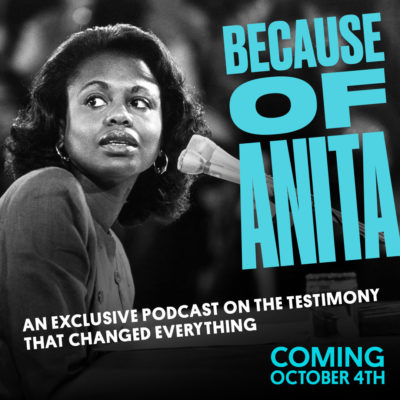
Because of Anita is co-hosted by Dr. Salamishah Tillet, cultural critic at The New York Times, and Cindi Leive, co-founder of The Meteor; it’s produced by The Meteor and Pineapple Street Studios.
Listen now and subscribe on Apple Podcasts, Spotify, Audible, Stitcher, or wherever you get your podcasts.
Photo credit: Bettmann / Getty Images
JOIN US IN LOS ANGELES FOR A SPECIAL EVENT WITH PROFESSOR ANITA HILL
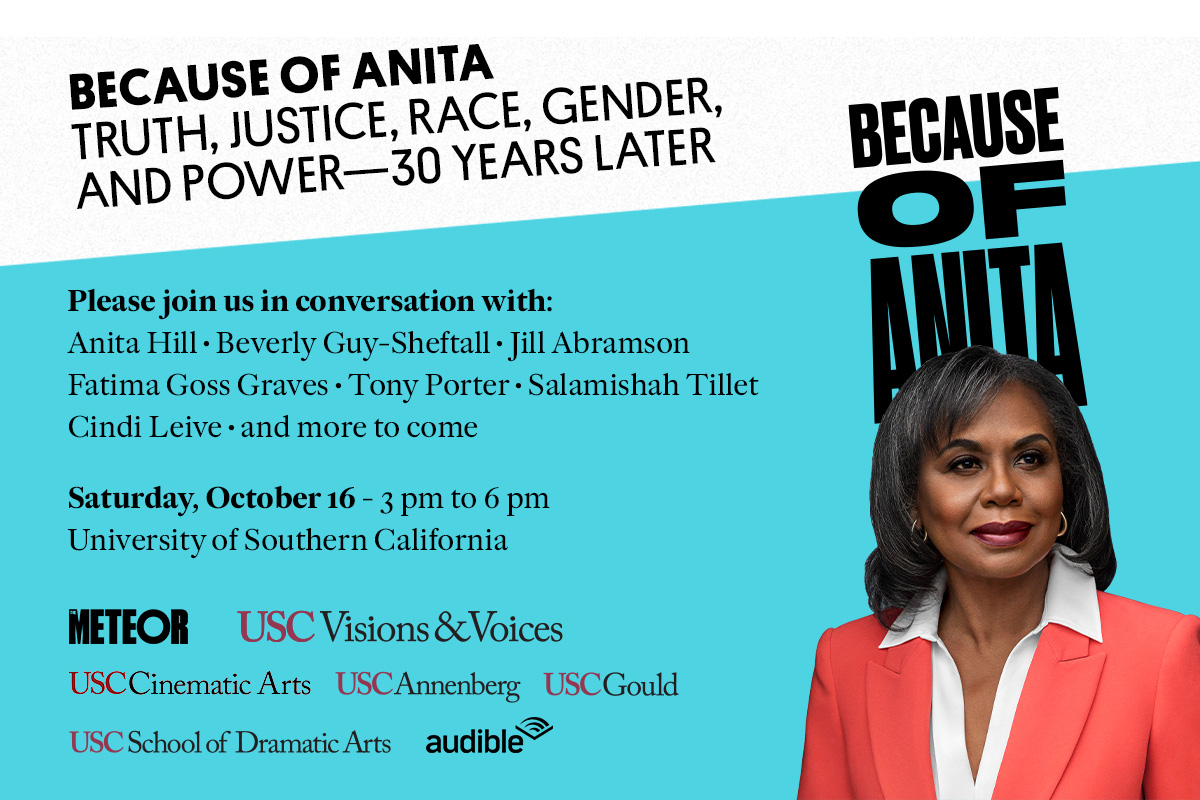
Thirty years after Professor Anita Hill started a national conversation about sexual harassment in the workplace, how far have we come on issues of gender-based violence? If you’re in the Los Angeles area, please join Dr. Salamishah Tillet and Cindi Leive, hosts of our new podcast Because of Anita, for an afternoon exploring these issues—featuring Professor Hill herself.
Because of Anita: Truth, Justice, Race, Gender, and Power—30 Years Later will be held on October 16 from 3 pm to 6 pm PT at the University of Southern California. This special event will feature artists, scholars, and activists in dialogue, along with a special keynote conversation between Professor Hill, author of Believing, and Beverly Guy-Sheftall, Anna Julia Cooper Professor of Women’s Studies at Spelman College. Visit The Meteor for updates. Rsvp now for this free event.
Presented by USC Visions and Voices: The Arts and Humanities Initiative and The Meteor. Co-sponsored by the USC Annenberg School for Communication and Journalism, USC School of Cinematic Arts, USC School of Dramatic Arts, and USC Gould School of Law. Special thanks to Audible.
Because of Anita: Highlights from our hosts
In 1991, Professor Anita Hill told the Senate Judiciary Committee that her former boss, Supreme Court nominee Clarence Thomas, had sexually harassed her. Thirty years later, you can still see the ripple effects of that testimony in our politics—and our lives.
That’s why we—hosts Dr. Salamishah Tillet and Cindi Leive—wanted to take a fresh look at the hearings. We’ve been working on this for months, and our new four-part podcast, Because of Anita, out today, shares what we’ve learned and what we’ve heard from politicians, artists, organizers, and scholars who were shaped by the hearings.
In the first episode—did we mention it’s out today?—we walk you through what actually happened that October weekend 30 years ago, with help from lawyer Kimberlé Crenshaw, who served on Hill’s legal team at the time; journalist Jane Mayer, who helped expose the hearings’ flaws; and actor Kerry Washington, who later immersed herself in the hearings for a film role as Anita Hill.
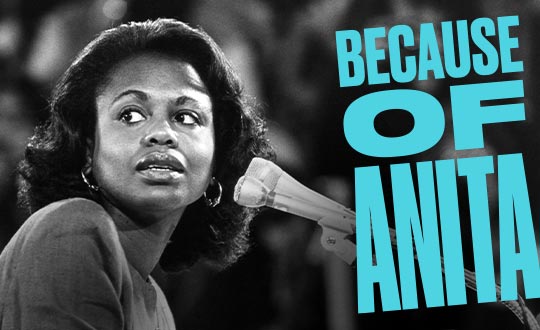
We had different, intersecting reasons for wanting to do this podcast. Salamishah had written about Anita Hill before, for Four Hundred Souls: A Community History of African America, 1619-2019. Revisiting the testimony for that essay—and thinking about the impact it had on her back in 1991, as a Black student in a mostly white high school—was illuminating, and she wanted to share what she’d learned with a different audience. Cindi had known Professor Hill for years—but had never interviewed her, and with the 30th anniversary approaching, couldn’t stop thinking about how far away and yet immediate those 1991 hearings were.
Part of what we both loved about this first episode is the deep dive into what actually happened at the hearings. It’s kind of shocking to listen to in retrospect: the interrogation of Professor Hill’s motives (“are you a scorned woman?” asked one Senator, almost mockingly), the witnesses not called, the spectacle of an all-white, all-male panel ruling on the word of a Black woman. If you’re new to the hearings, we think you’ll be riveted.
And our guests gave us so much to think about. Here are some of our highlights from the conversations in the first episode:
Salamishah: “For me, it’s Kimberlé Crenshaw using Thomas’s ‘high-tech lynching’ line to show the consequence of our country not using an intersectional analysis…or paying attention to how racism and sexism mutually harm Black women and Black communities.”
Cindi: “Professor Crenshaw’s interview had me on the edge of my seat. She was part of Anita Hill’s legal team, and there’s a scene where she and her colleagues walk out of the hearing and run into a group of Black women kneeling and praying on the steps of the Capitol. Crenshaw thinks they must be there to support Anita Hill, but then she realizes that they are there for Thomas. She understands the tide has turned, and it’s a pivotal moment in her life. I had chills when we were recording this.”
Salamishah: “Back then, for lots of Black people racism trumped sexism. Thanks to Hill, and so many other Black feminists, we have a more complex understanding of our oppression, and our resistance to it, today. Another moment that stuck with me is when Jane Mayer notes that the research she and co-author Jill Abramson did for their book Strange Justice: The Selling of Clarence Thomas revealed that there was a high probability that Thomas lied under oath. But as Mayer went on to tell us, ‘There are no statute of limitations for investigating a Supreme Court Justice. And I think that this subject still should be opened up and looked at again.’”
Cindi: “When she said that, I asked her jokingly, ‘Jane, I wonder who would be the journalist to do that investigation?’ But she demurred and said she’d leave that for a new generation. And given Thomas’s importance on the Court, I hope that happens.”
We hope you’ll subscribe so you don’t miss an episode, including a personal conversation between Professor Hill herself and Dr. Christine Blasey Ford, whose 2018 testimony before the Senate Judiciary Committee echoed Hill’s experience 27 years earlier.
Upcoming guests also include scholar Dr. Barbara Ransby, Ambassador Carol Moseley Braun, producer Drew Dixon, legal advocate Fatima Goss Graves, journalist Irin Carmon, and ‘me too.’ founder Tarana Burke.
Because of Anita is co-hosted by Dr. Salamishah Tillet, cultural critic at The New York Times, and Cindi Leive, co-founder of The Meteor; and it’s produced by The Meteor and Pineapple Street Studios. Listen and subscribe now on Audible, Apple Podcasts, Spotify, Stitcher, or wherever you get your podcasts.
Because of Anita: A podcast about the testimony that changed everything
Thirty years ago this fall, in October 1991, Professor Anita Hill delivered groundbreaking testimony in the Supreme Court confirmation hearings of Clarence Thomas. As the world watched, she sat in front of an all-white, all-male Senate Judiciary Committee and testified that Thomas had sexually harassed her years earlier, when he was her boss.
The hearings ignited conversations around race, gender, power, and sexual abuse that are as relevant today as they were three decades ago. Now, Because of Anita, an exclusive four-part podcast series, examines the legacy of Professor Hill’s testimony—and both what’s changed and what has not in the years since then. Co-hosts Dr. Salamishah Tillet, cultural critic at The New York Times, and Cindi Leive, co-founder of The Meteor, sit down with politicians, artists, organizers, and academics—all of whom have been shaped by the hearings, including:
- Professor Anita Hill, in conversation with Dr. Christine Blasey Ford, who testified in the 2018 confirmation hearings of Supreme Court nominee Brett Kavanaugh
- Key players during the 1991 hearings—and their aftermath, like lawyer and Professor Kimberlé Crenshaw, a member of Hill’s legal team; journalist Jane Mayer, who co-wrote a book about the confirmation; and scholar Dr. Barbara Ransby, who rallied Black women in a historic show of support
- Those who felt the ripple effects of Professor Hill’s experience, including Ambassador Carol Moseley Braun, producer Drew Dixon, and actor Kerry Washington
- Leaders in the work on these issues today, including legal advocate Fatima Goss Graves, journalist Irin Carmon, and ‘me too.’ founder Tarana Burke

Because of Anita is produced by The Meteor and Pineapple Street Studios. Making it has been a powerful, illuminating experience for us—we're excited to share it with you. Sign up now to hear every episode when it airs.
Listen now and subscribe on Apple Podcasts, Spotify, Audible, Stitcher, or wherever you get your podcasts.
Photo credit: Bettmann / Getty Images
Abortion access after Texas: Come learn what’s ahead
This month, Texas effectively eliminated nearly all abortion care. Senate Bill 8 (SB8), which bans abortion after six weeks of pregnancy, decimates access for close to 15 million Texans, and will hit Black, Latinx, and immigrant birthing people hardest. And as you’ve probably heard, it even offers a $10,000 bounty to anyone who successfully sues someone for facilitating an abortion after six weeks. What’s more, over a dozen states are poised to enact Texas-style laws, and this fall, the Supreme Court will hear a case that explicitly asks the Court to overrule Roe v. Wade.
So what can we do about this bleak landscape? Come join The Meteor for the workshop After Texas: The Fight for Abortion Access on Monday, September 20, at 5 pm ET, to find out.
JOIN US MONDAY TO TALK ABORTION ACCESS
Organized in partnership with the Center for Reproductive Rights and moderated by Dahlia Lithwick of Slate, this free virtual event will feature experts from the front lines: Amy Hagstrom Miller of Whole Woman’s Health Alliance, part of the coalition to stop SB8; Jenny Ma, one of the CRR attorneys representing the providers in the upcoming Supreme Court case; and Jessica Pinckney of Access Reproductive Justice in California.
We’ll learn:
- What Texas SB8 means for other states around the country
- What SCOTUS could do—and how you can make a difference
- Proposed solutions, including the Women’s Health Protection Act and the Department of Justice’s new lawsuit against Texas
No subject knowledge or organizing experience necessary—everyone is welcome!
MISSED THE WORKSHOP? WATCH IT HERE
The Meteor Fund welcomes individuals with disabilities to participate in its programs and activities. If you would like to request accommodations or have questions, please contact [email protected] in advance of your participation. Please note that we will make every effort to secure services, but that services are subject to availability.
This workshop is produced by The Meteor and is supported by The Meteor Fund, an affiliated charitable project of The Meteor. The Meteor Fund is fiscally-sponsored by New Venture Fund, a 501(c)(3) public charity.
Photo Credit: Alyssa Schukar/Center for Reproductive Rights
Emily Ladau: Disability is part of the human experience
I was born in 1991—just a year after the Americans with Disabilities Act became law—with a genetic joint and muscle disorder called Larsen syndrome. My mom has it, too. My disability has always been part of my life—a natural state of being.
 As the only kid with an apparent disability in my elementary school, I learned quickly what it meant to exist in a body that’s considered “wrong.” I’d often shy away from talking about my disability, and the biggest compliment you could pay me was that you didn't think of me as disabled.
As the only kid with an apparent disability in my elementary school, I learned quickly what it meant to exist in a body that’s considered “wrong.” I’d often shy away from talking about my disability, and the biggest compliment you could pay me was that you didn't think of me as disabled.
But at age 10, I found myself heading in the complete opposite direction, beginning to embrace myself and opening up about my experience as a disabled person in a very public way: by appearing on “Sesame Street.” Hanging out with Big Bird, Elmo, and Oscar the Grouch was a whole lot of fun, but the best part was beginning to find my voice as an advocate. The experience of educating about disability on a national platform showed me the power of storytelling and communicating as a way to break down stigma and debunk stereotypes.

Though I’d planned to become a high school English teacher, the sparks of disability advocacy that started when I was young began to turn into flames. Midway through college, my plans began to shift as I realized that I wanted to pursue advocacy as a career. So, a week after graduation, I went to Washington, DC, to complete an internship program led by the American Association of People with Disabilities. But I gained so much more than work experience. I gained an understanding of disability as an identity and a sense of belonging to something so much bigger than just me. In finding the disability community, I began to find myself.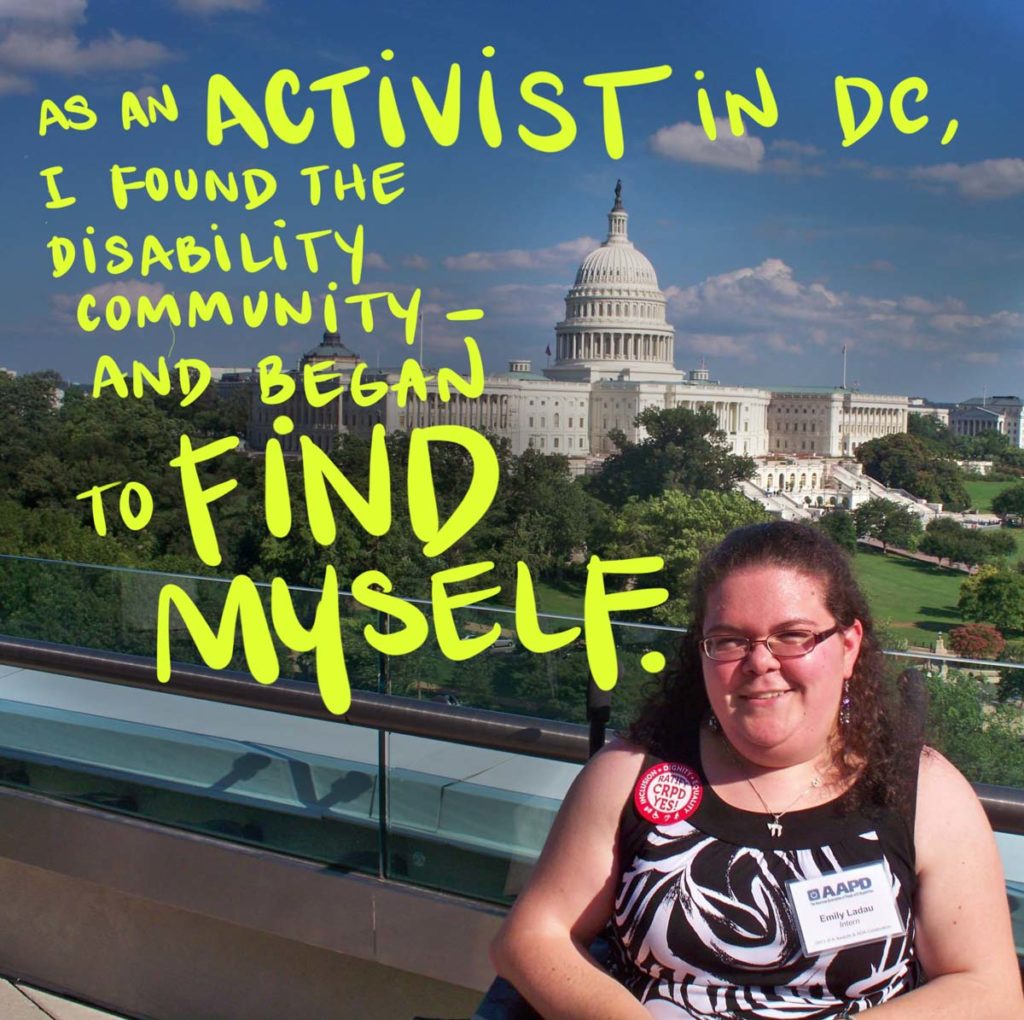
As my passion for activism grew, so too did my realization that if we want the world to be accessible to the disability community, we must make disability accessible to the world. That's not to say I believe disabled people exist simply to be teachable moments, but rather that I believe in meeting people where they're at in a world where disability remains so unfamiliar to so many.
But the disability experience isn’t just my story, or my mom’s story, or any one person’s story. It’s the story of one billion people around the world. And for so many of us, our stories are steeped in ableism, in a lack of acceptance of who we are. My hope is that my new book Demystifying Disability: What to Know, What to Say, and How to Be an Ally, will help to shift the paradigm to a more inclusive world.
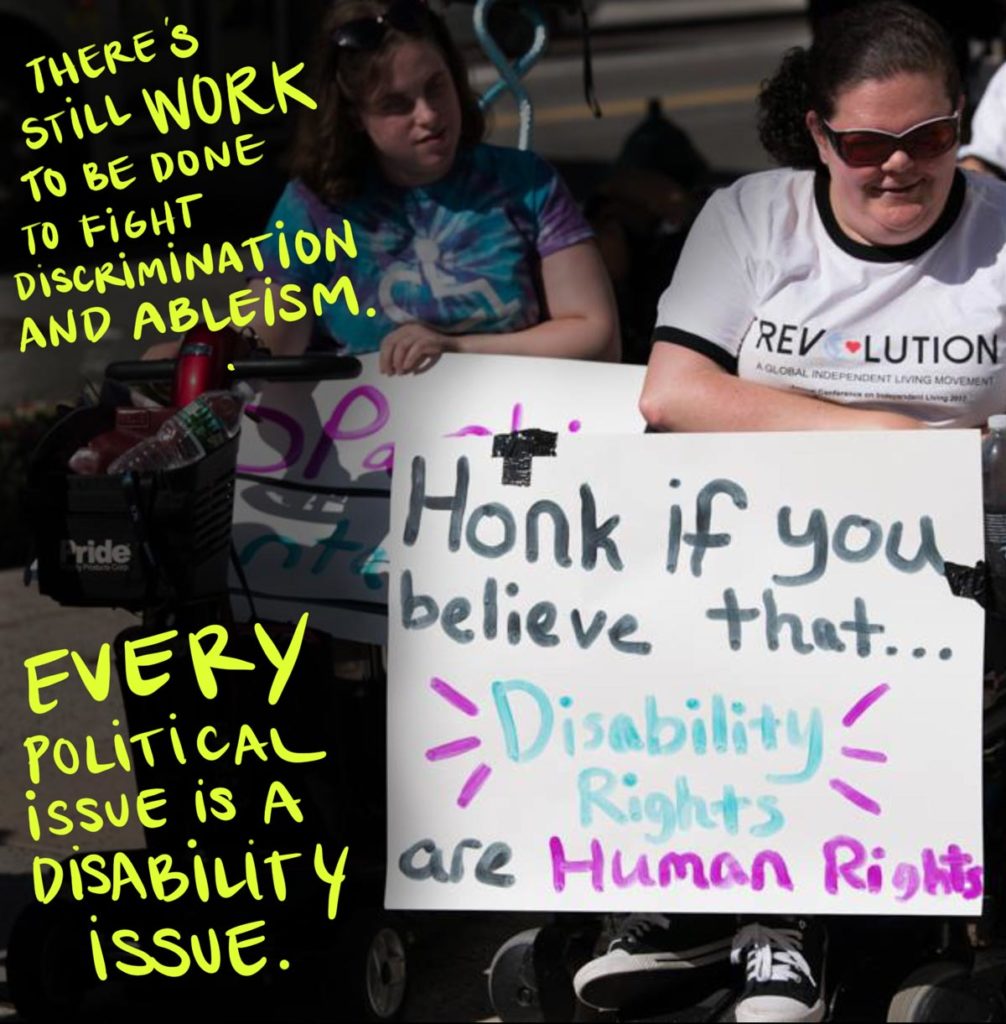
To do this, we first need to understand and recognize ableism and how it manifests in the world.
SO WHAT IS ABLEISM?
Ableism is discrimination and prejudice against people with disabilities, though that’s not quite enough to convey its full weight. So here’s the definition I use. “Ableism is attitudes, actions, and circumstances that devalue people because they are disabled or perceived as having a disability.”
To most of society, ableist beliefs and behavior don’t raise any red flags because they’re woven into the fabric of everyday life, simply accepted as the norm. For disabled people, though, ableism is always there—a part of our lives that never disappears, manifesting in endless forms ranging from broad, systemic discrimination to individual interactions.
HIDDEN DISCRIMINATION EVERYWHERE
Here’s an example. Less than 25 percent of New York City subway stations have elevators. This qualifies as systemic ableism, because the lack of accessibility limits the freedom of disabled people to get around. I do occasionally brave the subway, but it’s not uncommon for me to be the only wheelchair user on the platform. Strangers will express surprise, making individual ableist comments such as, “Wow, it’s amazing how you get around in that chair.” Of course, if every subway station had an elevator, it wouldn’t be considered anything special to see wheelchair users on the train. But many people operate on the assumption that disabled people don’t have full lives that might require public transportation. And if this assumption weren’t embedded in society’s thinking, making sure every subway station has an elevator would be more of a priority. See what I mean? Ableist assumptions lead to systemic ableism, which lead to further discrimination.
Think about it. There are still laws on the books that explicitly discriminate against disabled people. The nearly century-old Fair Labor Standards Act was created to be supposedly “fair” for everyone, but people with disabilities are the only population, as named in the law, who can legally be paid far less than the minimum wage. Even worse, this happens in segregated work environments known as “sheltered workshops” where disabled people are paid a few cents per hour to do repetitive tasks—the same tasks that nondisabled people would be paid at least minimum wage to complete in a regular workplace.
Advocates in favor of sheltered workshops and subminimum wages argue that such things are necessary because the disabled people who work in these conditions would otherwise have no job prospects. Organizations that run sheltered workshops (like Goodwill—sorry, thrifters) think they’re doing a good deed while getting a good deal on labor. But pennies for piecework isn’t acceptable just because the workers are disabled. It’s ableist. Instead of having such low expectations for disabled people, what if we finally left the past behind and demanded fair pay and inclusive workplaces for all?
THE WORLD I WANT
Fighting back against ableism in its many iterations feels like playing a never-ending game of whack-a-mole. Most of the time it’s nondisabled people who take issue with my anti-ableism advocacy. If I speak up about a place that I can’t get into because I use a wheelchair, I’m called a complainer. If I mention that a line in a play I’ve just seen was, in my opinion, ableist, I’m told I’m overthinking things. If I think that a news story about a disabled person overcoming an obstacle is condescending and then comment on it, I’m accused of being bitter and coldhearted. But it’s not bitterness that drives me; it’s my passion to move toward a more accepting, loving, equitable world.
If you’re just starting the journey of figuring out accessibility, there will be a learning curve. After all, accessibility can take many different forms—handrails to hold on to in a bathroom; transcripts for a video or podcast; a website that can be navigated with software that reads text on the screen; using plain, clear language in a document. But I promise it’s not that complicated. A good first step is to do some research: Two of my go-to resources for finding answers are the ADA National Network and the Job Accommodation Network (JAN).
If you’ve been ableist, I don’t want you to feel dismissed for that out of hand. I agree with filmmaker, consultant, and streamer Dominick Evans, who tweeted about ableism: “It’s embedded in our culture, and I had to learn to be better, so how can I expect nondisabled people to know how to be better? What gets me is when people learn the harm they’ve caused, and double down about it.”
I believe that you can do better. We all can.
Emily Ladau is a disability rights activist, writer, and speaker. She is the editor in chief of Rooted in Rights and co host of “The Accessible Stall" podcast and her writing has appeared in The New York Times and HuffPost. A founding member of The Meteor collective, her new book, Demystifying Disability: What to Know, What to Say, and How to Be an Ally, is out now.
Excerpt from DEMYSTIFYING DISABILITY: What to Know, What to Say, and How to Be an Ally.
Copyright © 2021 by Emily Ladau.
Published by Ten Speed Press, an imprint of Penguin Random House.
Illustrations by Bianca Alvarez
Introducing "In Love and Struggle: A Black Woman Grows in America"
What does it mean to live in your skin as a Black woman in 2021? There are many ways, and The Meteor’s new Audible Original, In Love and Struggle: A Black Woman Grows in America, touches on 11 of them.
In this powerful new work, women ages from 17 to 90—from a TikTok star to a two-time Pulitzer-winning playwright—share stories about love, work, microaggressions, mothering, and just being.
The new release builds on 2020’s live performance and Audible special, In Love and Struggle, a collection of storytelling, monologues, music, and comedy featuring Anita Hill, Sarah Jones, Alicia Garza, and more.
Executive produced by cultural critic Rebecca Carroll and the Apollo Theater’s Kamilah Forbes, and directed by Noleca Radway, this year's special features activist/student Treasure Brooks, author and playwright Pearl Cleage, poet Jasmine Mans, music producer Drew Dixon, dancer and choreographer Carmen de Lavallade, playwright Lynn Nottage, comedian Franchesca Ramsey, audio journalist CC Paschal, teen advocate Ve’ondre Mitchell, and TV host Bevy Smith.
With sound design and production by Twi McCallum and music by Sabine Blaizin, In Love and Struggle: A Black Woman Grows in America is available now on Audible.
LISTEN NOW ON AUDIBLE
Watch the trailer and hear the contributors in conversation:
Watch highlights from 21 For ’21: Visions For a Feminist Future
How do we build a better, freer, more just world? That’s the question on the table at 21 For ’21: Visions For a Feminist Future.
In five days of programming leading up to a virtual gathering on May 18, The Meteor brought together a cross-generational group of leaders, activists, artists, and special guests—all sharing their vision for gender equity and a better future for women, girls, and nonbinary people in 2021 and beyond.
21 For ’21 featured visionary leaders including Joy Buolamwini, Hillary Rodham Clinton, Brittany Packnett Cunningham, Dr. Silvia Federici, Travon Free, Roxane Gay, Ilana Glazer, Amanda Gorman, Meena Harris, Gloria Steinem, and more. The program included conversations, short films, performances, and monologues on issues from climate change to immigration to disability rights to caregiving—because every issue is a feminist issue.
The all-star lineup also featured: Hafsat Abiola, Rumaitha Al Busaidi, Regan Aliyah, Farai Chideya, Lana Condor, Sage Dolan-Sandrino, Maryangel Garcia-Ramos Guadiana, Angel Harris, Maria Hinojosa, Eileen Huang, Andrea James, Alexis McGill Johnson, S. Mitra Kalita, Sabah Khodir, Andraéa LaVant, Cindi Leive, Rev. Dr. Jacqui Lewis, Francia Márquez, Shantell Martin, Madison McFerrin, Paola Mendoza, Yume Morimoto, Amanda Nguyễn, Chani Nicholas, Sharmeen Obaid-Chinoy, Phillip Picardi, Liz Plank, Lorella Praeli, Emily Ramshaw, Chelsea Jackson Roberts, Reshma Saujani, Kulsum Shadab Wahab, Sonal Shah, DeLanna Studi, Noor Tagouri, Jasmine Wahi, and Raquel Willis.
The event also featured The 21 For ’21 Syllabus, presented by The Meteor Fund. In it, 21 visionary thinkers share works they believe point the way to a better, more feminist tomorrow. Contributors include Alicia Garza, Phoebe Robinson, Jose Antonio Vargas, and more, recommending materials from W.E.B. Du Bois to Whoopi Goldberg.
Watch some of the highlights of 21 For ’21 below:
https://youtu.be/X2SCc5iI5KI
Activist, host of UNDISTRACTED, and MSNBC contributor Brittany Packnett Cunningham sat down with writer, comedian and Oscar-winning director Travon Free—who talked about masculinity and its constraints, especially, he says, for Black men.
https://www.youtube.com/watch?v=jIDba3oeB3U
Everything that went wrong this year for working parents and caregivers? She predicted it. In this conversation, Reshma Saujani, founder of Marshall Plan for Moms, sat down with legendary activist Dr. Silvia Federici, co-founder of the Wages for Housework movement of the 1970s. Their discussion is revelatory—and might forever change how you see the “labor of love” women give to their families.
https://www.youtube.com/watch?v=I3B2QZGapgA
In a year of trauma and momentum in the AAPI community, how are women using their platforms to draw attention to AAPI women, girls and nonbinary people? That was the subject at hand during a roundtable with actress and producer Lana Condor, 2019 Nobel Peace Prize nominee and Rise founder and CEO Amanda Nguyễn, and founding president of The Asian American Foundation Sonal Shah, as they sat down with former Secretary of State Hillary Rodham Clinton. The group covered women’s leadership, allyship, and what we don’t learn about AAPI history.
https://youtu.be/S_PgnXkCcyk
2021 inaugural poet Amanda Gorman joined writer and activist Gloria Steinem in a conversation about the five words they each hope to use more in the future, from “intersectional” (Gorman's first choice) to "spaceship earth." (Steinem will explain!) Listen in.
https://youtu.be/JvfbloRFoJg
What will it take to change the world? For Francia Márquez, legendary environmental activist and now Colombian presidential candidate, the answer starts at the top. Director and activist Paola Mendoza sat down with Márquez to hear about her impassioned—and dangerous—fight for her country.
https://youtu.be/DSXiM8da1tM
Rapper and entertainer Regan Aliyah performed her original song written for 21 For ’21, “The Future,” and shared her hopes for a “fully inclusive feminist future.”
https://www.youtube.com/watch?v=xuNJlCNF68c
Oscar-winning documentary filmmaker Sharmeen Obaid-Chinoy has a simple truth for all of us: “Being a big pain in the ass is how things change.” Let her explain.
21 For ‘21 is a project of The Meteor, and is presented by CHIME FOR CHANGE, Gucci’s global campaign for gender equality.
The 21 For ’21 Syllabus is produced by The Meteor Fund, an affiliated charitable project of The Meteor, which is fiscally sponsored by New Venture Fund.
Mariane Pearl: Behind my ballot
Journalist Mariane Pearl can claim four nationalities—but the US is the one country she chose freely. Here's the intensely personal story of her American vote.
Photo illustrations by Debbie Millman
In June 2009, I was naturalized as an American. That day, on my last trip to Garden City, New York, to the now-defunct United States Citizenship and Immigration Services office, I spring-walked by billboards shooting their messages to the heavens. Becoming American felt like an accomplishment for me, a chance to review the ideals I held in a new light and commit to them. It felt like hope, a lifting in my chest, an aspiration to love a new country. This was the interview, the fifth and last test in the naturalization process. Sitting next to me were a man from India in a brown suit and a pale pink tie, and a young woman from Colombia with tiny sunsets on each of her nails. All three of us were about to become citizens of America—to raise our right hands, so help us God.
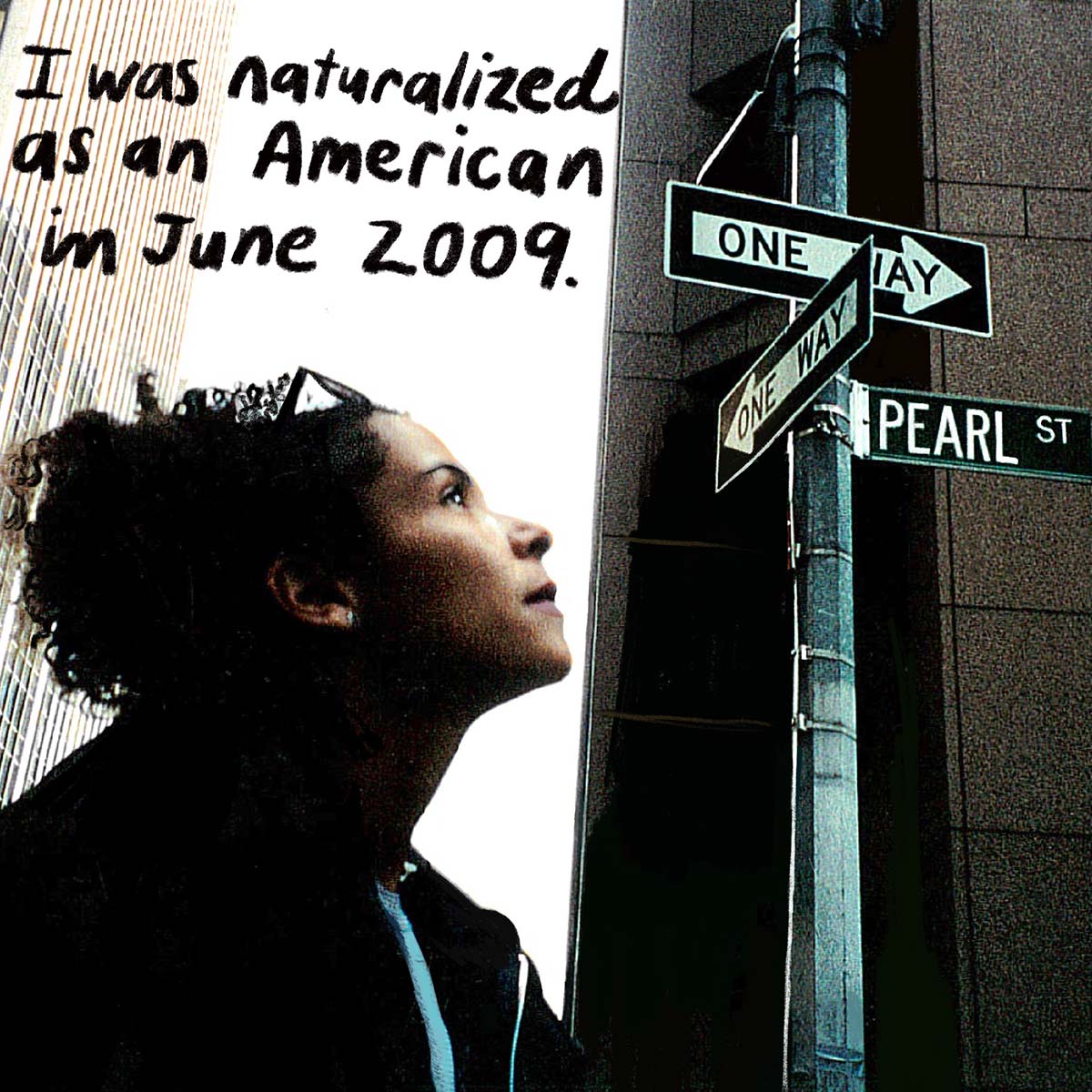
Eleven years in, it still means everything to me to be part of the only nation on earth that so thoroughly weaves all 194 other countries into its fabric. And in 2020, as I fill out my ballot from an ocean away, I feel more than ever before as if I am sending my heart by express mail.
America was the first nationality I actually chose, but it was my fourth overall. I was born in France, to a Cuban mother and Dutch father, and I look like everyone’s idea of an immigrant. Parisians take me for North African; Americans for Latina; and I certainly don’t look Dutch to the Dutch.
I realized the complexities of otherness early on. At nine, I went with my family to visit a Cuban friend of my mom’s in Algeria. I discovered then that North Africans were not only the grocery-store owners on our street, but a vast assortment of people, with languages and governments and cities. I was mesmerized and ashamed. Until then I’d been child enough to think that everyone had poor black relatives from Cuba and a rich white family from Holland. It was terrifying to realize the extent of my ignorance.
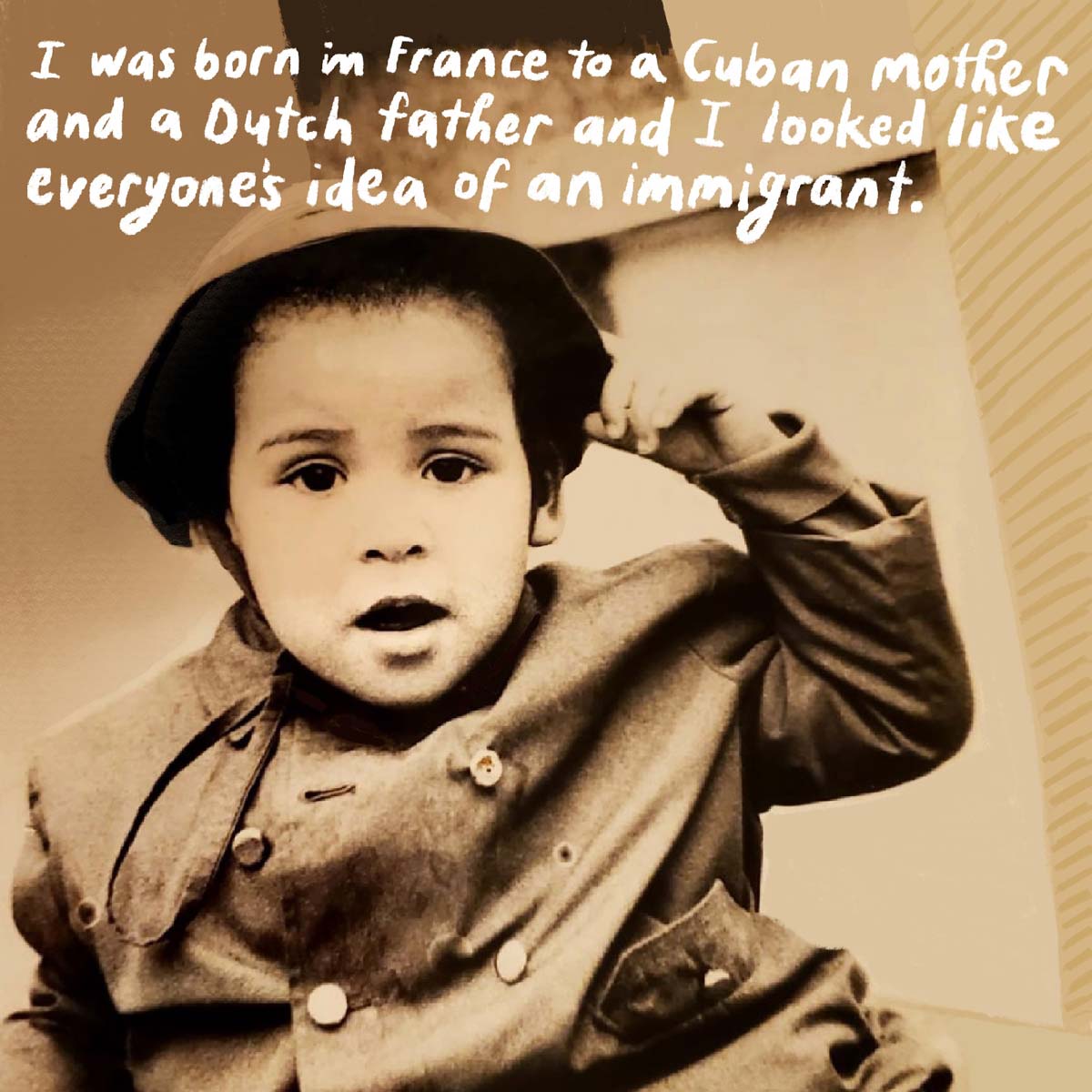
Back in France, where I was often assumed to be Arab, I sensed how tricky life was for Muslim girls there, tiptoeing their way between the expectations of dueling cultures. But when people found out I was half-Cuban, the generally hostile immigration mood turned to good-humored nostalgia. Was it true, people asked, that women who work in cigar factories roll tobacco leaves on their sweaty bare legs while listening to Victor Hugo’s Les Misérables read aloud? The sheer arbitrariness of xenophobia sent my head spinning.
At our rented flat in the XIXth arrondissement in Paris, there was a small manicured lawn outside with a few deserted benches. The grass was off limits, as were ball games, dogs, music and expressions of enthusiasm. We moved in when I was six; my father was still alive then and the flat was rented to him: a white-as-clay Dutch mathematician and Holocaust survivor with somber green eyes, a scientist who had brought a colorful family back, like pinned butterflies, from Cuba, where he’d been one of the first crew of foreigners drawn by the revolution.
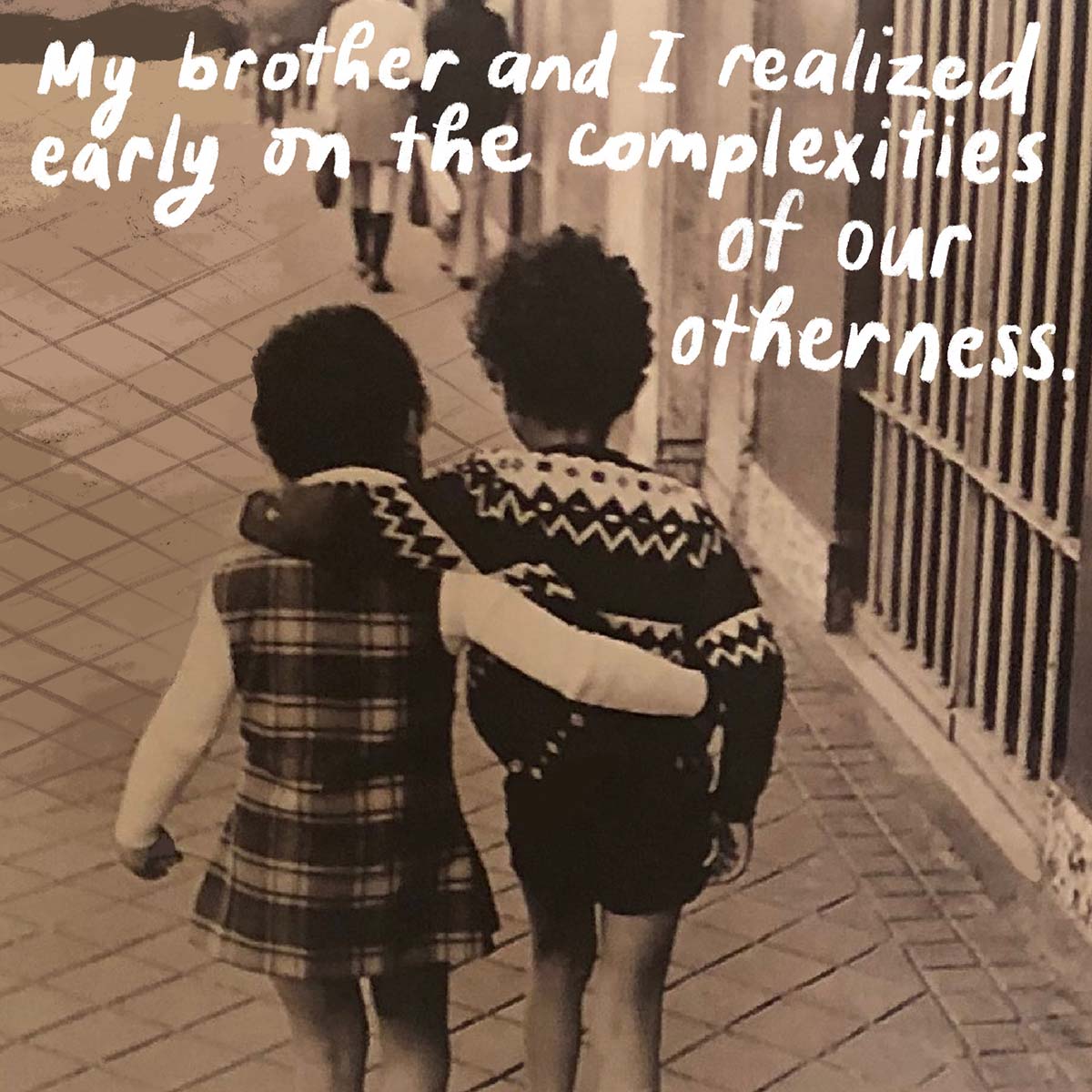 By the time I knew him, my father was defeated, disillusioned by Cuba’s turn to dictatorship; he had given up hope in politics. He only emerged after dark. He liked our house motionless, undisturbed by the whistle of the dishwasher or the soundtrack of TV; my brother and I asleep and our voices quiet. And every night he turned more into a ghost, a negative version of himself. He died by suicide on a warm and lonely Sunday afternoon in Paris in August of 1976.
By the time I knew him, my father was defeated, disillusioned by Cuba’s turn to dictatorship; he had given up hope in politics. He only emerged after dark. He liked our house motionless, undisturbed by the whistle of the dishwasher or the soundtrack of TV; my brother and I asleep and our voices quiet. And every night he turned more into a ghost, a negative version of himself. He died by suicide on a warm and lonely Sunday afternoon in Paris in August of 1976.
After he died, we stayed on in that building, though on a different floor and in a smaller flat in which rent was a monthly struggle for my unemployed, widowed mother. Yet our new flat on the first floor was life itself. There was laughter and loud conversations; the light in our one-bedroom home that sometimes slept eight was the last in the building to go off at night.
Until things became more complicated. As we grew up, my brother started walking the tightrope of identity and belonging, and struggled to find himself in French society. His last name is as Dutch as it gets, but his face said North Africa. I saw him come home with his head bleeding so much he could open neither his mouth or eyes; he’d had a short conversation with two girls who happened to be dating white supremacists with bats. Or he would arrive deflated from another humiliating job interview after a man expecting an Aryan-looking candidate found my brother instead.
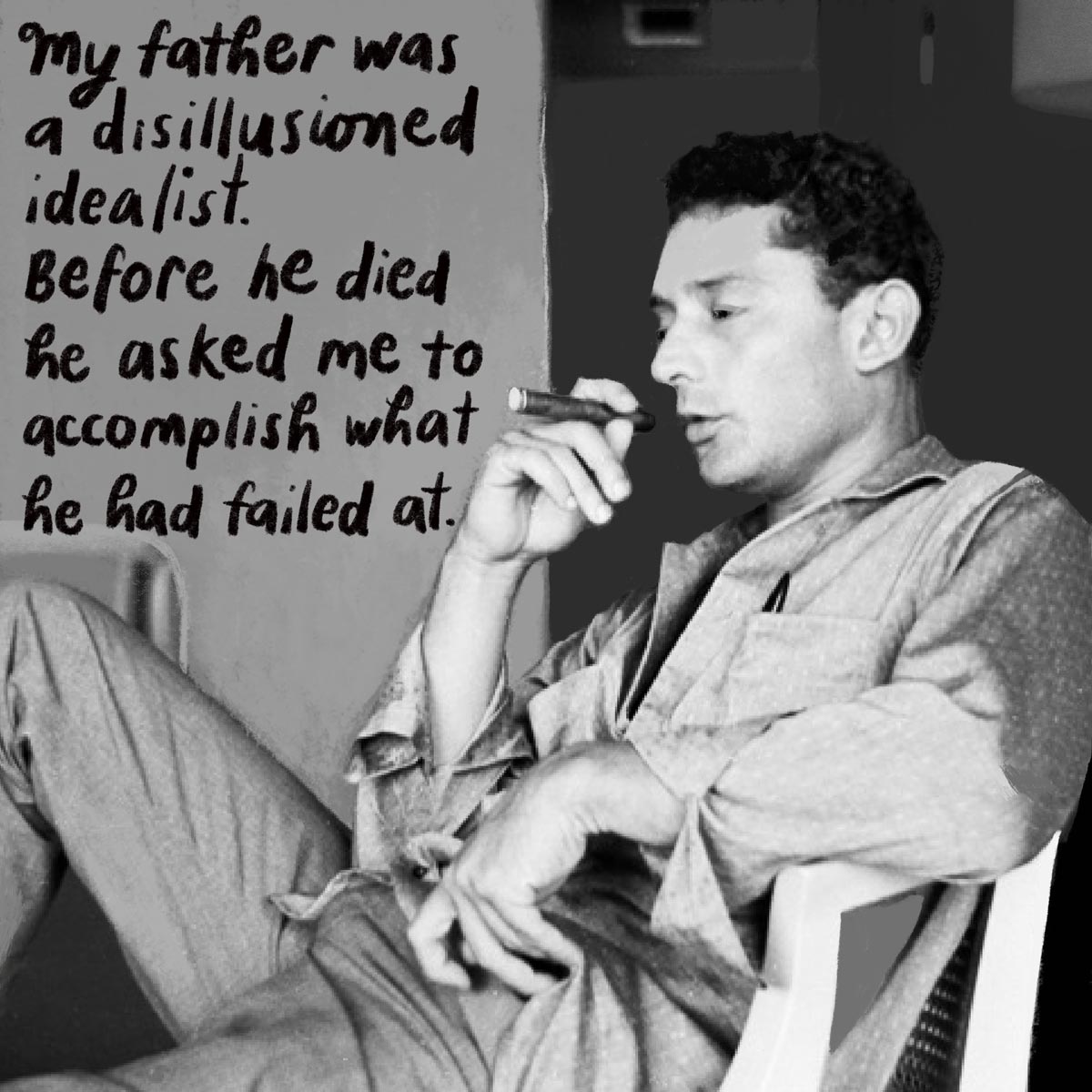
Before his death, my father had asked me to accomplish what he had failed at. Those were literally his words: “Promise to accomplish everything I failed at.” I was nine. The meaning eluded me at the time, and I had nothing to hold onto from him—besides my name, which I knew he had chosen for its significance: a reference to Marianne, France’s national emblem, representing democracy and resistance to oppression since the birth of the republic on July 14, 1789, when starving people had taken over the lavish kingdom. My name felt like a message from my father, and as a teen, I took it seriously, and became a secret patriot. (Secret, because everyone I knew shared a cynical distrust of anything political.) But in the privacy of my mind, I aspired to my namesake’s democratic values. In one painting by Delacroix, Marianne stands on corpses, leading the way for the insurgents, her country dress ripped off by the claws of injustice, but with her light intact. The reality of France never quite measured up, but may we French continue to search for her.
By the time I added America to my little melting pot of a life, I had married (and lost) one American, and given birth to another.
I met my husband Danny while working as a journalist in Paris at RFI, French public radio, where I was hosting a daily show called "The Magazine of Migrations." Danny lived in London, but was reporting for The Wall Street Journal in Saudi Arabia about the plight of foreign workers there.
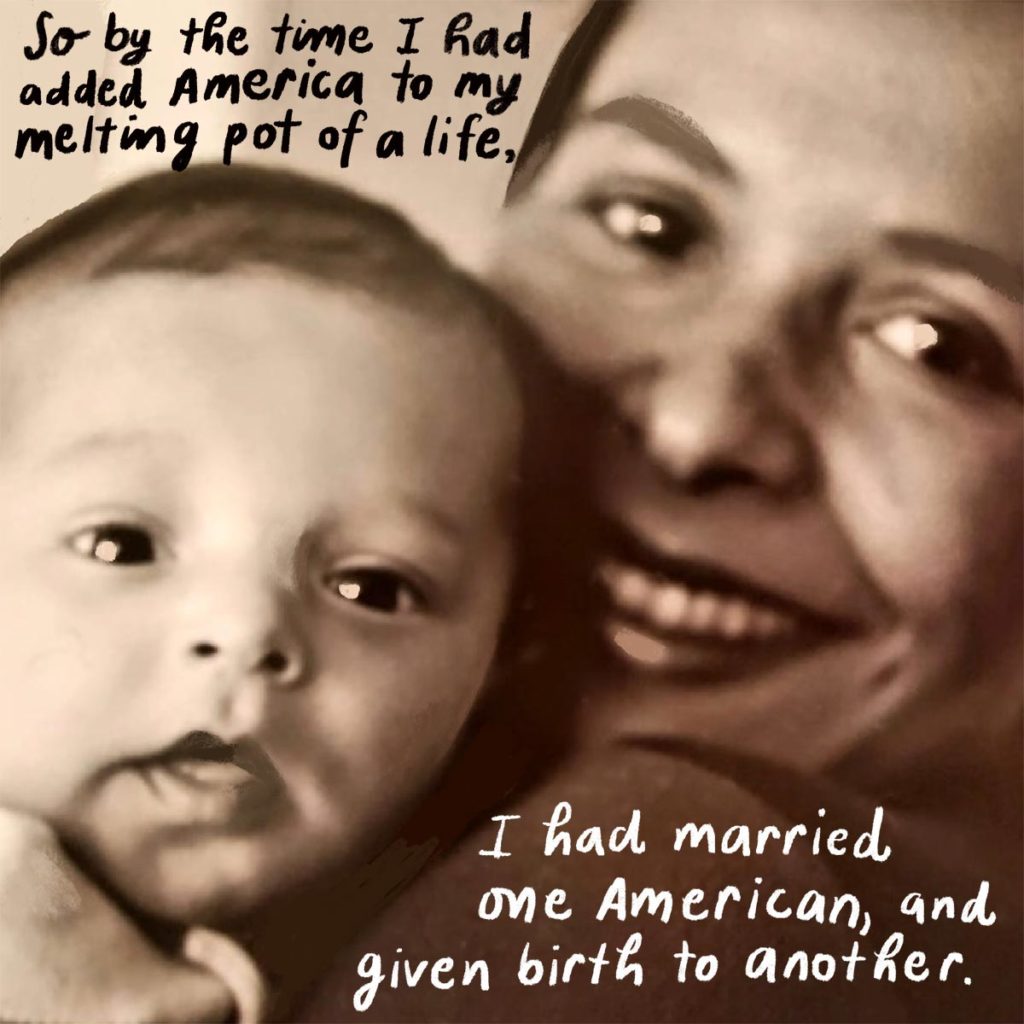
Among some journalists we knew, immigration and related matters were considered the worst possible beat. It meant ducking into tales of lost lives; it meant figuring out who people used to be back when they were the doctors, the nurses, the teachers, heads of their families, pillars of their nations. To me, though, the immigrants I met were modern-day adventurers (some by choice, some not), exploring the human condition. On the show, guests would share what France meant to them. Liberty, Equality and Fraternity actually had meaning to these forced travelers—these ideas meant the difference between life and death. My inner Marianne of the republic was thrilled.
When we got pregnant with our son, Danny and I were living in Mumbai, India, working as journalists. In our enthusiasm for diving into foreign cultures, we had selected a neighborhood where we were the only nonlocals. I’d been going through life as if tolerance was written in my DNA—it was not. We lived in a Jain building, which meant we were to respect every form of life as sacred. Residents walked with bare feet so as not to step on an ant. Meanwhile, right outside our flat, on the sidewalk, lived a family of six, the youngest a little girl I instantly fell in love with. The daily built-in injustice felt unacceptable to me. Every time I walked out of the house, I was forced to confront prejudices I didn’t know I had—over how we as people should live.
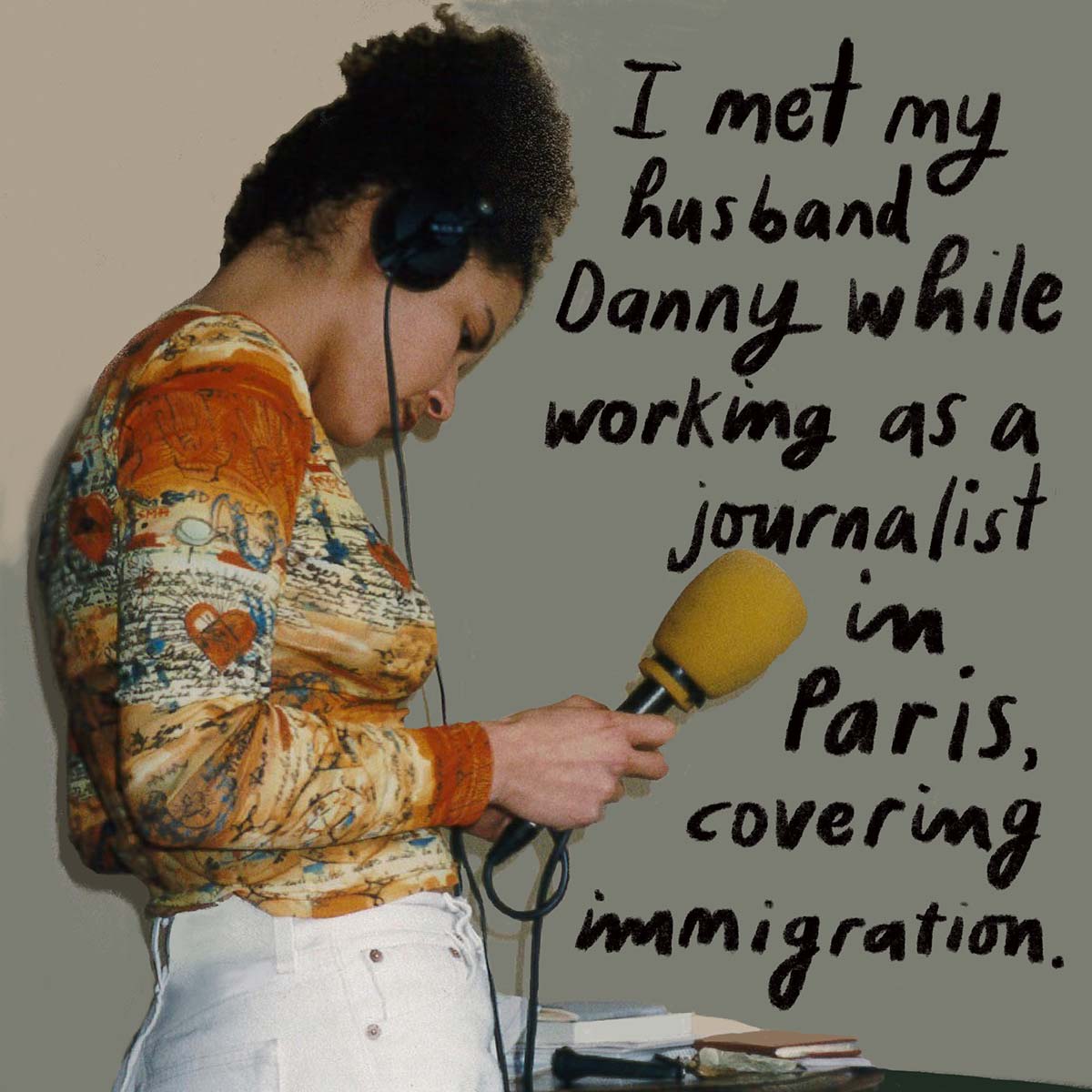
So in Asia, Danny and I worked hard at stretching the limits of our own minds. Danny had long asserted his worldliness by choosing a Dutch, Cuban, French, Buddhist girl as his wife. He was a Jewish kid from Los Angeles whose father was born in Israel of Polish origins and mother born in Baghdad. Adam, our son, was conceived in India and traveled to five countries before he was even born. We were in Asia, we hoped, to tell stories that could connect people and help us understand one another.
Then Danny was kidnapped and murdered by Al Qaeda terrorists—men who stood at the opposite end of the values that had cemented our relationship. Men who had trained to drain themselves of every hint of empathy and compassion. Men who kill puppies and other innocent creatures for practice. A generation of lost soldiers from discarded wars.
The night in Karachi when I realized Danny wasn’t coming home, I ran into the bedroom of the posh but soulless house where we had been staying—all beige marble and mirrors—and locked myself in to howl like a wild animal. It was almost Eid al-Fitr, the break of the Muslim holy fast, and I could hear the cries of sheep herded in the neighbors’ yards. I saw then how History leaves its deep, dirty footprint on your soul when you ignore its ripple effects.
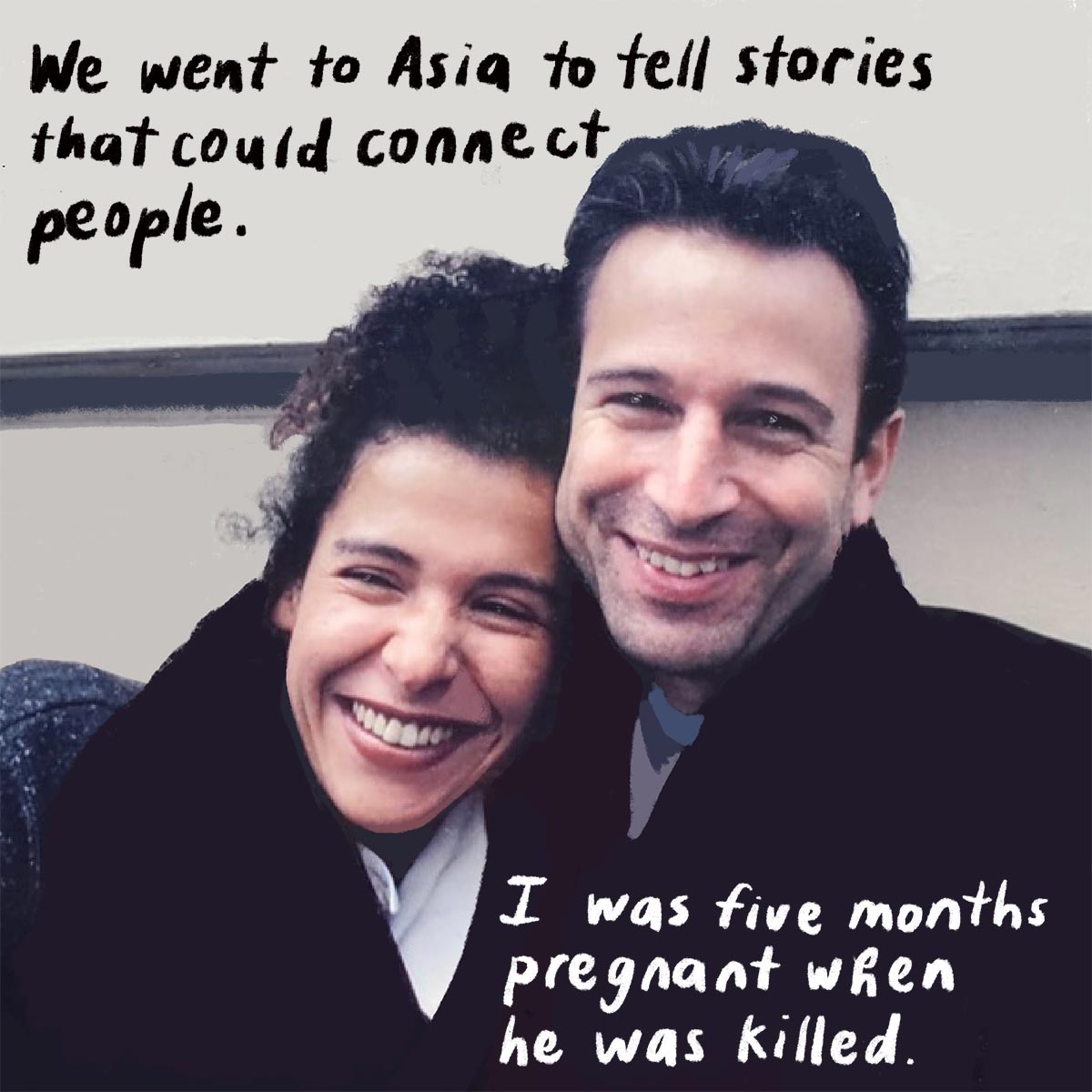
Outside my door was an unusual mix of humankind. The people who had helped me try to save Danny were all praying for both of us. Everyone had overcome their limits to try to find him: Cops and journalists had agreed to work together; Pakistani with Americans; men with a pregnant woman. The prayers I heard that day were Jewish and Buddhist and Muslim, Catholic and secular—a litany that felt like the ultimate expression of our shared humanity.
In the days after Danny’s death, I went to visit then-President Musharraf to protect the man who had taken the most personal risks to save my husband: a Pakistani senior police officer who today is one of my son’s honorary godfathers. I listened to President Musharraf speak about how Americans were too arrogant. Then I flew to the U.S. and met with President George W. Bush, who complained to me that Pakistan was not trustworthy. Both heads of state seemingly sincere, and somewhat puzzled by the other’s behavior. I have never felt as lonely as I did that night, six months pregnant, in my hotel room in Washington, D.C.
How were they ever going to understand one another?
Only immigrants, I felt, could achieve such a miracle.
If I hadn’t been so exposed to multiple identities early in life, I might have gleefully sought comfort in hatred after Danny’s death. I understand why people find it reassuring—a single-minded story, bare and righteous, that spares us the existential angst. But blind faith in my own view was not an option for me. Our world has managed to kill hundreds of millions of its own by relying on that perspective.
My father and mother saw that firsthand. One came from the Holocaust, the other from slavery—and they’d seen in Cuba that political systems inevitably fail you. Yet they still clung to a belief in people, ordinary ones, and especially immigrants and seekers as they were. By shifting their trust from politics to the people it is supposed to guide, they saved my soul. And when I sought my U.S. citizenship, years after that meeting with the president, it was not because I believed in the American government, but because I had managed to preserve a genuine and lasting faith in its people.
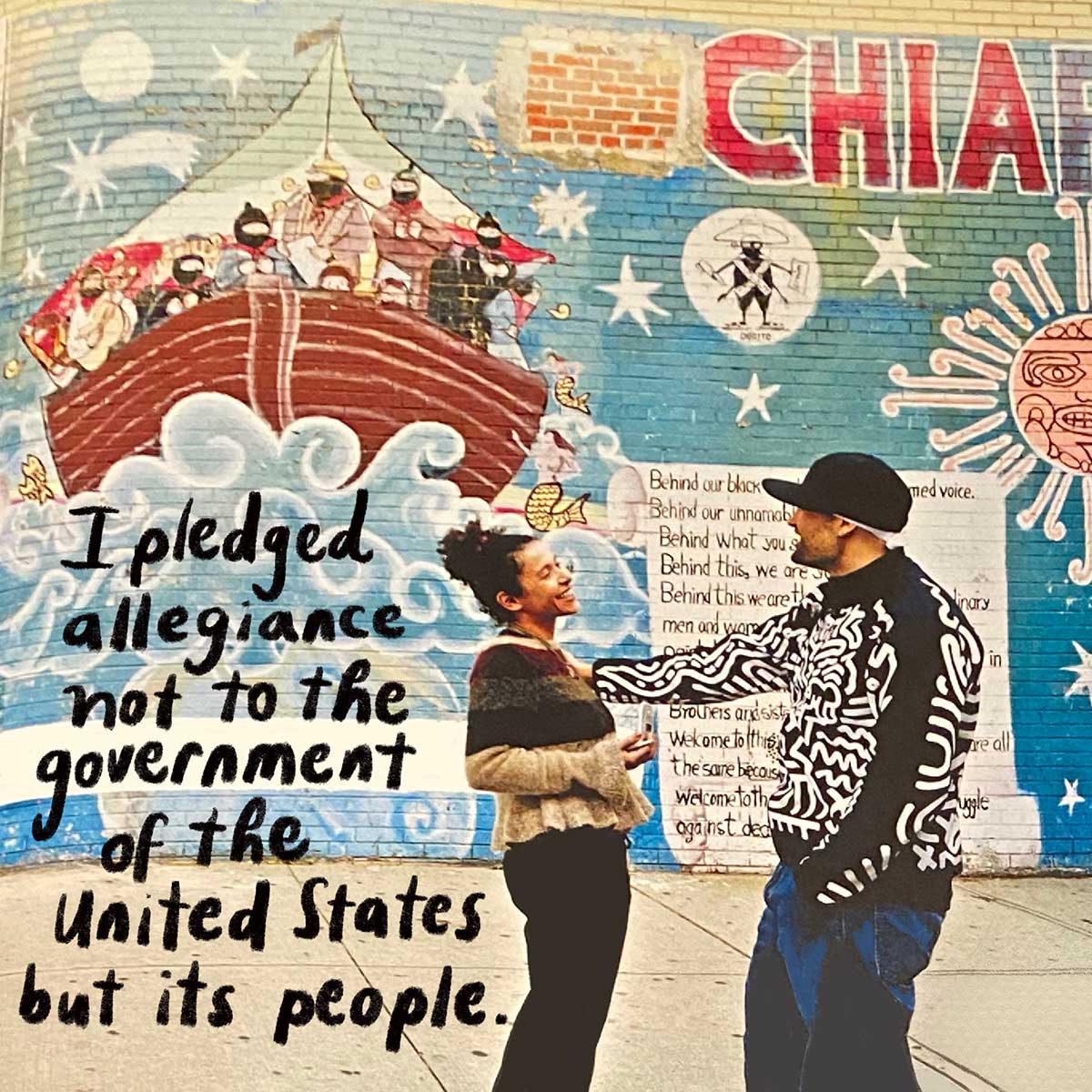
I still have that faith. As citizens of a country with vastly more immigrants than any other, we Americans have a unique history: Everyone has or had relatives who remember the war, the famine, the sexual or religious persecution, the ethnic cleansing, or the promise of growth that brought their families to the U.S. So we are the good and the ugly together, the oppressors and the oppressed, the terrorists and the freedom fighters, the dreamers, the refugees and the wild west capitalists. But in the U.S. as elsewhere, blood has spilled and is still flowing—that of Native nations, of slaves then and Black people now, asphyxiated or shot to death. This year it flowed anew, with the cries of caged children, the 140-character leadership, the recurring white extremism, George, Breonna, Atatiana, Stephon. It’s for them—and for myself—that I cast my vote this time.
This fall, and as elections loom, I have found myself thinking of a story I did back when I was reporting in Paris. Danny and I had just met, and I was working in the Pigalle neighborhood, next to a small local church that looked more like a store. Home of the famous Moulin Rouge, Pigalle was a hotspot for traffickers, a place that smelled of urine and sex. Every day, I would see people coming and going to that church, a United Nations of lonely people, most ordinary, usually women. They came for Santa Rita, the patron saint of abused people, parents, widows; those who are lonely, hurt, infertile, ill. (You could see why she attracted women.)
Inside the church, the statue of Santa Rita hovered over a large polished copper bowl filled to the rim with small notes folded several times over.
“There it is,” the priest said. “The vote of the voiceless.”
You mean voice of the voiceless? I asked him.
“Actually, I mean both,” he said, smiling.
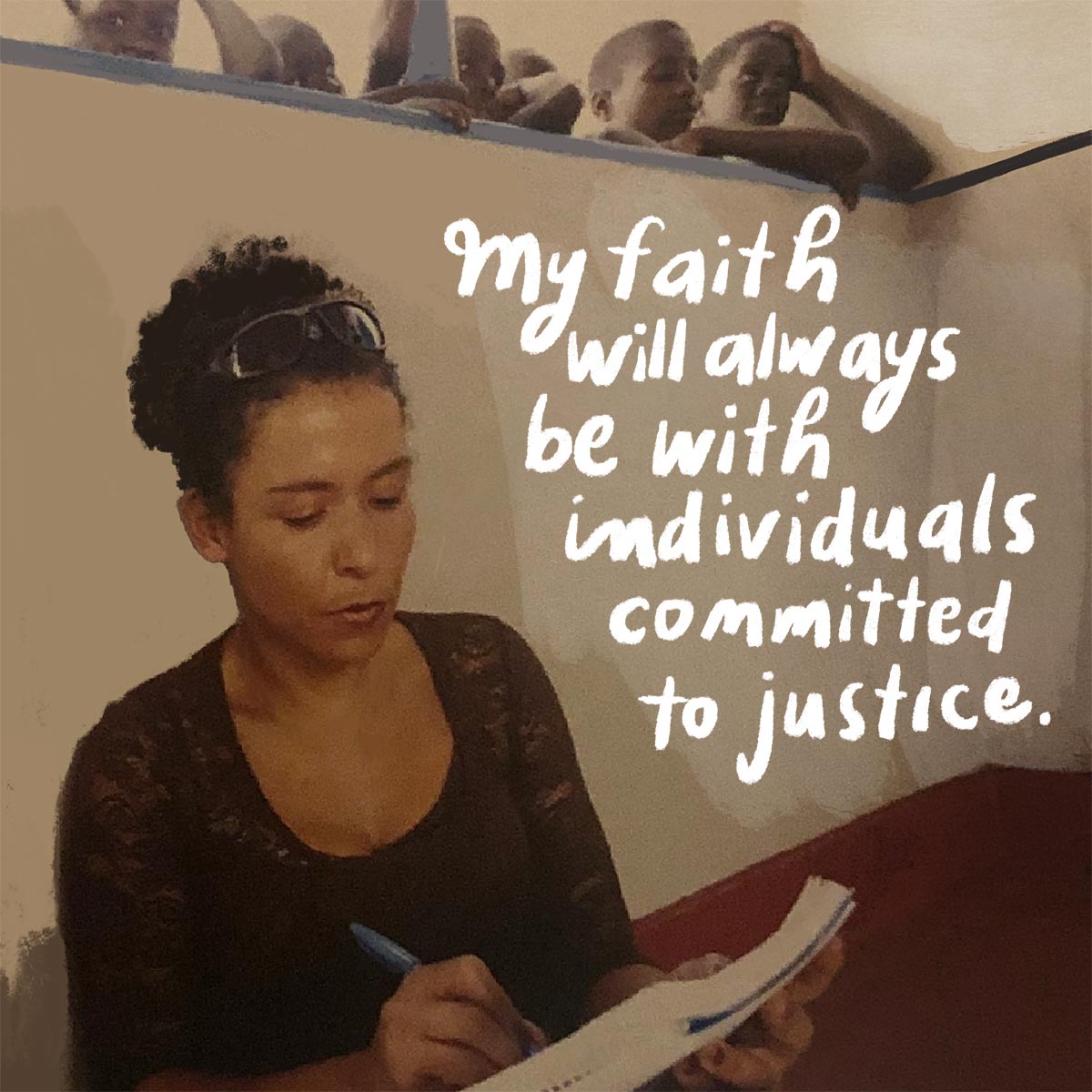
The priest read a few messages to me. Abused women who wanted out, people fighting sickness and solitude, a transgender person in search of self. The priest was right—by filling the bowl with their most intimate wish, each person was voting for survival. The unwritten stories behind their votes were there too. The perilous clandestine journeys to Europe, the hunger, the cold nights, the lines at the soup kitchen, the violence around sex, the unfathomable past traumas, the betrayals. But gathered here they found a place where someone would listen, even if just a statue. The ballots they cast were for meaning and vision; they wanted a change, and also safety, hope, and justice.
As we all do when we vote. Don’t we come to the ballot with everything we are and everything we’d rather be? With our cultures, our traumas, our aspirations, our definition of home, our understanding of how the world works and how it should be?
Where I currently live, in Barcelona, Spain—yes, another place—people are engaged in the Independence struggle and showcase their support by hanging Catalan flags, yellow with red stripes, from their balconies. I am often asked by my neighbors here which of my countries I would display if I were to choose one. To their sometime surprise, I always say America.
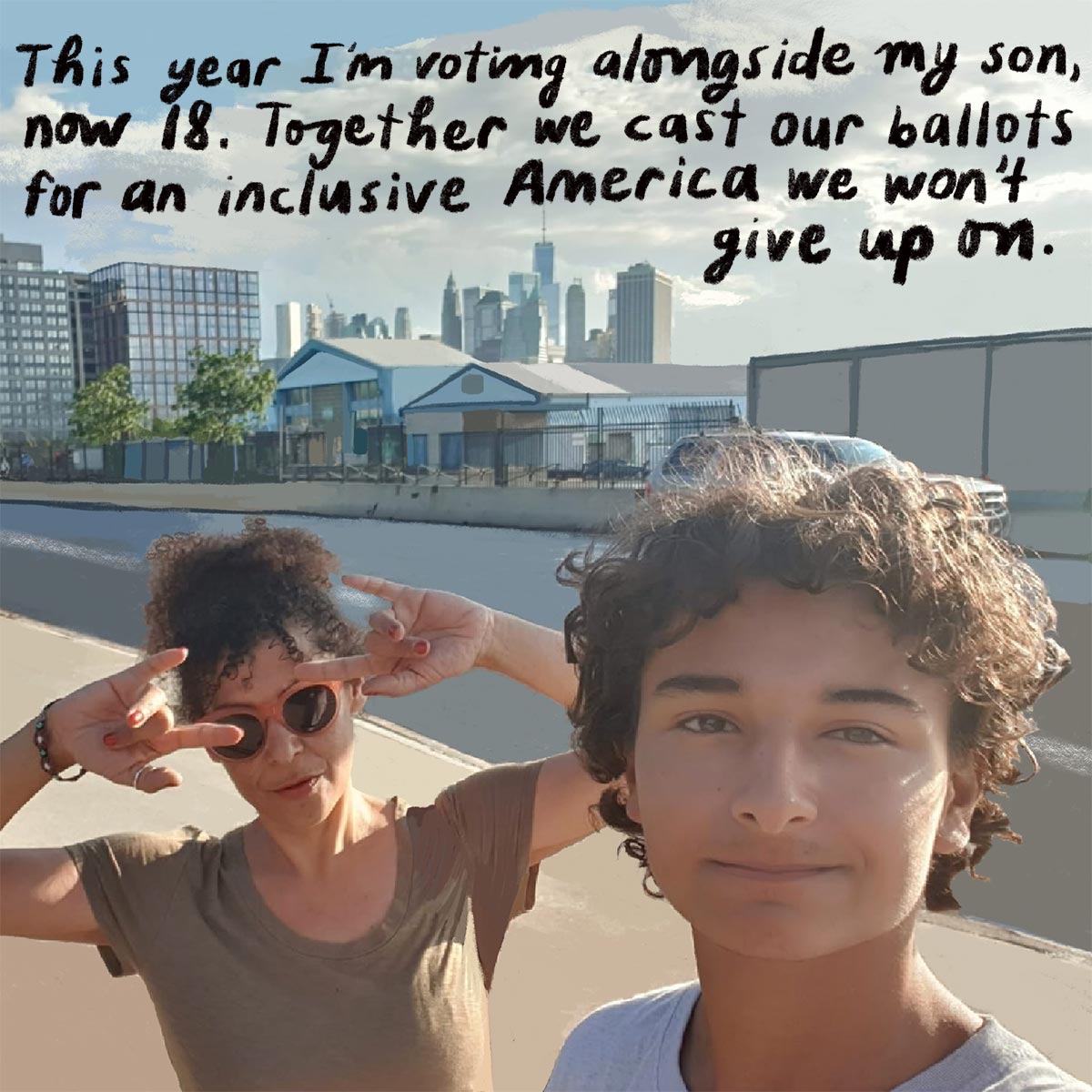
And so, maybe strangely, does my son. Just as my father chose my name for its symbolism, Danny chose our son’s name—Adam, like the first man, a wish for the 21st century to get its act together and allow peaceful coexistence for its global citizens.
He is now 18, and on November 3, will be working as a translator in New York for Spanish-speaking voters who look like him. And like me, he will be voting—with our shared hopes for a country we still believe in.
Photo illustrations by Debbie Millman. Debbie is a writer, designer, educator, artist, brand consultant and host of the podcast "Design Matters." Follow her on Instagram @DebbieMillman
Voter suppression: A conversation with directors Dawn Porter and Liz Garbus
Voting is an American tradition, but so is preventing people from voting. As part of our voting rights countdown to the election, 30 Days Till Tomorrow, The Meteor held a socially-distanced outdoor watch party for the VP Debate at the Queens Drive-In in New York City together with Rooftop Films.
The event featured a conversation about voting rights in America with two directors who’ve spent years diving into the issue—Liz Garbus ("All in: The Fight for Democracy," co-directed by Lisa Cortés) and Dawn Porter, a founding member of The Meteor (“John Lewis: Good Trouble”).
“Voter Suppression: Then and Now,” moderated by Rebecca Carroll of WNYC (host of “Come Through” and also a Meteor founding member), explains some of the ways citizens have been robbed of their right to vote in the past—and still are today.
Watch the extended cut of their conversation
https://www.facebook.com/WeAretheMeteor/posts/185480286361612
Creative Producer: Marjan Tehrani • Editors: Ellen Callaghan and Sophie Geidt • Music: Emily Wells
“When we look at the course of our history, we see these expansions of the franchise and contractions, like a roller coaster,” Liz Garbus explains, highlighting as one example the Mississippi Plan of 1890—enacted after 67% of Black voters participated in elections—which required would-be voters to both read and interpret the Constitution.
Voter disenfranchisement is still going on today, Garbus continues. “When you look at the kind of ID laws that are enacted in various states, they have a disproportionate effect on poor people, young people, people of color,” she explains. “Texas is a great example. You can vote with your gun license—that’s an acceptable ID—but your student ID or your public housing ID is not. So if you’re really worrying about voter fraud, then why wouldn’t you allow all those IDs in play? No—because it’s about race and it’s about power.”
Compounding the problem, both directors agreed, are recent changes to voter legislation, in particular, the 2013 Supreme Court legislation of Shelby County vs. Holder, which allowed voting jurisdictions with a history of discrimination to escape federal oversight.
“Until the Shelby decision, it was really important a fair justice department had the ability to review changes to voting laws,” explains Porter. “That was the ‘pre-clearance” provision of the federal voting laws. And when that was struck down, that is when you see this flood of efforts.”
Changes to voting laws resulted in many people not being able to vote in 2016. “You saw all this dialogue in 2016 about Black and brown voters not showing up for Hillary Clinton, but nobody was talking about Shelby County. Nobody was talking about all the poll closures. Nobody was talking about the fact that different IDs were required in the state since 2013,” says Garbus. “Something really big had happened in between 2012 and 2016 and that is one of the reasons these films are important is giving you that broad view of that expansion and contraction of the franchise.”
Make a difference right now
Alarmed? You should be. Angry? Also correct. Determined? One hundred percent. Let’s all go reclaim what’s ours. To support all Americans’ right to vote, go to Fair Fight where you can sign up to text bank, help document voter experiences or, if you’re able, donate.
Learn more
Watch “John Lewis: Good Trouble” produced and directed by Dawn Porter about the life of legendary Congressman John Lewis.
Watch “All in: The Fight for Democracy” directed by Liz Garbus and Lisa Cortés about the life and work of voting rights advocate and former Georgia gubernatorial candidate Stacey Abrams.
